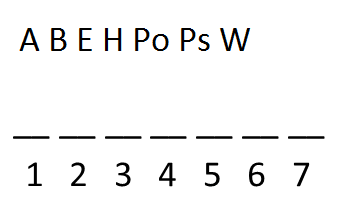A couple weeks ago, we briefly explored “unless” statements when I provided the following example and asked you to translate it into a standard if/then statement.
I refuse to keep writing formal logic blog posts unless some of you post
comments telling me you’re finding these helpful. 🙂
Well, it’s time to check back in and see how you did.
But first, an easier example
It’s always warm in California, unless it’s winter.
This example is more straightforward because it doesn’t contain as many tricky elements like “refuse” (a negative) or “some” (a qualifier). So, let’s figure out how to turn this UNLESS statement into an IF/THEN statement.
When we read that sentence, what do we definitely know? Some follow up questions might help:
- If it’s spring, what do we know about the temperature in California? Well, we know it’s warm in California unless it’s winter. Spring isn’t winter, so it must be warm.
- What if it’s fall? Again, it must be warm.
- What if it’s summer? It still must be warm.
In other words, we know it’s going to be warm in California at any time that is not winter. Thus, we can safely say that if it is not winter, then it is warm in California. And there’s our first IF/THEN form of an UNLESS statement.
In abstract terms, that means that the statement “A unless B” is equivalent to the statement “If not B, then A.”
Now, using our mastery of contrapositives, we can also say with certainty that “If not A, then B.” Returning to the example, that means that “If it’s not warm in California, then it’s winter.”
Can we tell anything more than this?
This is where a lot of people get confused. In common speech, when we say something like “It’s always warm in California unless it’s winter,” we might mean that’s it warm all year except winter, when it’s cold. In other words, we treat the word “unless” as though it creates a two-way relationship. That is, both sides of the equation are triggers.
Unfortunately, that is not the technically correct usage of “unless” from a formal logic standpoint. Unless does not create a two-way relationship; UNLESS creates a necessary and sufficient relationship. Let’s examine further.
It’s warm in California unless it’s winter.
We already know that if it’s not winter, then it’s warm in California. We also know that if it’s not warm in California, then it’s winter.
But what if we only know that it’s winter? Does that mean it’s cold? Not necessarily. It’s possible that it could be winter and still be warm in California. Our original statement is simply telling us that it definitely IS warm if it’s NOT winter. That doesn’t mean that it definitely IS cold if it IS winter.
It’s easy to get caught up in the language and lose yourself, so here’s another example that might be easier to visualize.
John does not go to the party unless Rachel goes to the party.
In other words, there’s no way John is going to show up at that party unless Rachel is there. So, if John goes to the party, then Rachel is definitely there, too.
On the flipside, if Rachel does NOT go to the party, there’s no way John will go to the party. These are our two valid IF/THEN statements based on the UNLESS statement.
Again, in abstract terms: “A unless B” is equivalent to “if not B, then A” and “if not A, then B.”
But what if Rachel DOES go to the party? Does that mean that John now has to go? Nope. We know that he only goes if Rachel goes, but John never said he would definitely go if Rachel goes. And what if John DOES NOT go to the party? Does that mean that Rachel also stayed home? Nope. We just established that it’s possible for Rachel to go to the party and John to stay home.
So remember that UNLESS statements create a necessary and sufficient relationship just like IF/THEN or ONLY IF statements. They DO NOT create a two-way relationship the way that IF AND ONLY IF statements do.
Returning to the original example…
I refuse to keep writing formal logic blog posts unless some of you post
comments telling me you’re finding these helpful. 🙂
Some of you posted comments telling me you’re finding these posts helpful. So, what does that mean?
Well, we know that “A unless B” translates to “if not B, then A” and “if not A, then B.” In this case, our A term is “I refuse to write more posts” and our B term is “some of you post comments.”
Thus, we can translate our phrase as:
If none of you post comments, then I refuse to keep writing more posts, or
If I DON’T refuse to keep writing posts, then some of you posted comments.
Neither of those phrases tells us what to expect if some of you DO post comments, so you can’t make any valid predictions about whether I will write more posts.
Lucky for you, I’ve decided to write more posts, so the mystery is solved.
Hope this was helpful! It’s one of the most confusing logical structures on the LSAT, but taking the time to understand and master it now will pay off in Logic Games and Logical Reasoning.
Happy studying! 🙂






Leave a Reply